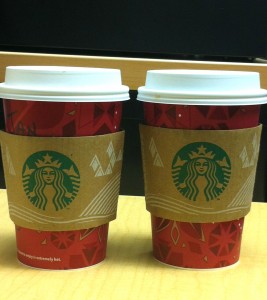This is where Starbucks comes in. I suspect that more business is conducted at Starbucks coffe shops than anywhere else. It’s sort of every small business owner’s “office away from home”–neutral networking territory. If you do the whole networking thing, certainly you’ve had the “Let’s meet for coffee” meeting.
Coffee meetings are safe. Generally you’re not billing for time at a Starbucks meeting. Being an accountant, I think some people are afraid to come to my office. They think that if they walk though my door I’ll put the meter on and start billing them. (I’m not that bad, really!)
Many small business owners don’t have offices, so Starbucks is a good place to hold a meeting. I know some small business owners who spend hours at Starbucks. For the price of a cup of coffee you also get a table to work at and an internet connection.
So, how do Starbucks coffee receipts fit into your tax return? I’ve got two ways:
- 1. You meet a business acquaintance for coffee and you pick up the tab for both of you. Keep track of the meeting and you easily meet the 50% deductible rule.
- 2. You meet a business acquaintance for coffee but you only pay for your own coffee. (This is pretty common.) You can still probably claim this as a business expense but you have to be a little more careful. There’s an old 1953 court case (Sutter v. Commissioner of Internal Revenue http://www.leagle.com/decision/195319121ttc170_1172) that states that you can’t deduct entertainment expenses just for yourself if you’re paying what you normally pay for something.
So — If you’re going to Starbucks everyday and picking up a latte whether you’ve got a meeting or not– that’s a normal expense for you so a Dutch Treat Starbucks coffee isn’t a deductible business expense for you.
On the other hand, if you’re not buying gourmet coffee unless you’re at a business meeting, then you’d be allowed to claim that expense. The whole key here is to document, document, document. For me–I pay a $30 fee to my office manager so that I may have coffee at work. At one cup a day, that works out to $1.50. At Starbucks, my coffee costs $4.50; so clearly, I’m not normally spending $4.50 on coffee unless I’m having a meeting.
Under the Sutter rules, I don’t have to subtract my normal coffee cost from what I spend, I can deduct 50% of the whole cost. I just have to be able to prove that my normal coffee cost is less than $4.50.
Does the IRS really go back to 1953 tax court cases when they audit returns? Yes, as a matter of fact, they do. Even though there have been significant changes to tax law since that case, Sutter is still invoked in audit cases with high entertainment expenses.
Personally, given how many people use Starbucks for their meeting rooms and internet connections, I think the IRS should allow a 100% deduction for Starbucks as a rent and computer expense. But don’t try that, it won’t fly with the IRS. The best you’ll get is a 50% deductible meals and entertainment expense.


Hi Nicholas,
So you’re suggesting that you buy the Starbucks as coffee for your home office in a solo proprietorship? (Note: Nicholas is a CPA.) I’m still thinking that won’t fly. In my opinion anyway. What do you think?
coffee for home office: solo Proprietorship
Hi Ariadna,
Right now, you may only deduct your Starbucks coffee if you are meeting with someone else. I know, it doesn’t seem fair, and I would like to see that rule changed, but if you’re going alone to work, it doesn’t count as a tax deduction.
Hi, What if you go there to work on paperwork, cause you have no office? Is it a deduction?
Hi Ryan,
You’re fine with your online register for that.
Thanks for saving me from making a mistake. I have question on if documenting expenses has changed in the internet era. I track everything online via service. Could I jot down via my online register what the Starbucks bill was for (Met John and discussed new website)? Or do I still need a paper receipt?
Thanks!
Ryan
Thanks Brian,
I wish all my clients would keep such good records. How many small business owners miss out on claiming the full cost of things like bringing coffee or donuts to the meeting because the receipt looks like a 50% “meal and entertainment” expense? If people would just make a little note on their receipts at the time of the event: “coffee with Brian” or “coffee for the office meeting”, their EAs could make sure the taxpayer gets to claim the best possible deduction.
Starbucks coffee is my ideal illustration for explaining to new tax professionals a summary of facts learned about meals and entertainment in their EA exam course. A multitude of situations are uncovered from simply reviewing the free sample questions at http://fastforwardacademy.com/enrolled-agent-exam-prep.htm. For instance, if I bring Starbucks coffee for everyone to a meeting at the office, the entire cost is deductible. That’s the rule for food and beverage costs incurred to keep employees working. Conversely, if I meet an employee at Starbucks to discuss business, only half of the expense is a tax deduction. I receive no tax benefit for regularly purchasing coffee at Starbucks while working on my laptop — as you point out. That’s one item serving as a tasty example for every tax scenario.